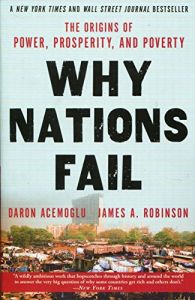
A review of
Why Nations Fail
The Origins of Power, Prosperity, and Poverty
The review below was first published in the getAbstract Journal on Dec 12, 2019.
We’ve reviewed this title for you as we currently cannot offer a summary. We hope this expert review provides valuable insights in the meantime.
We’ve reviewed this title for you as we currently cannot offer a summary. We hope this expert review provides valuable insights in the meantime.
Equality Nourishes Nations
by David Meyer
Renowned experts Daron Acemoğlu and James A. Robinson parse why and how some nations endure and others vanish.







Comment on this review